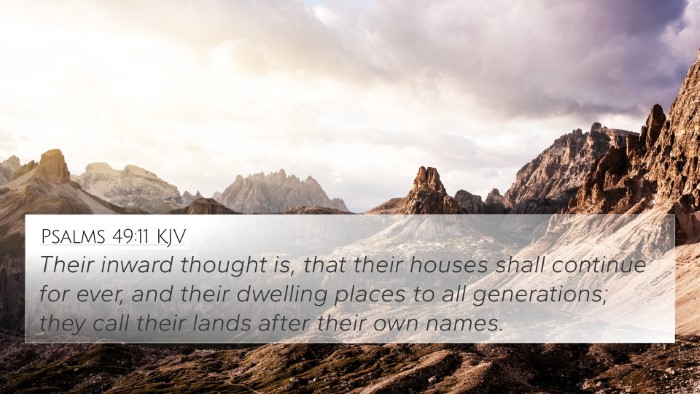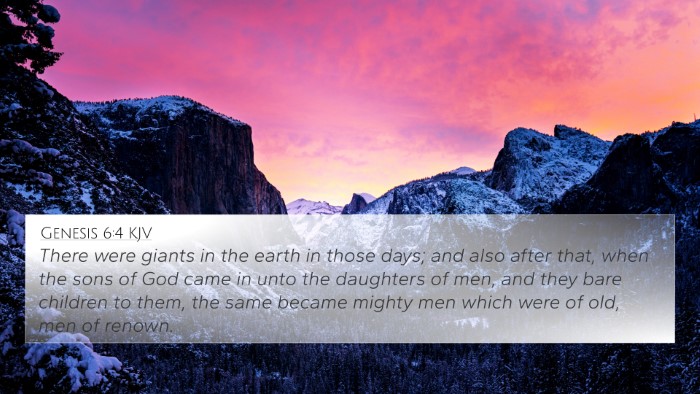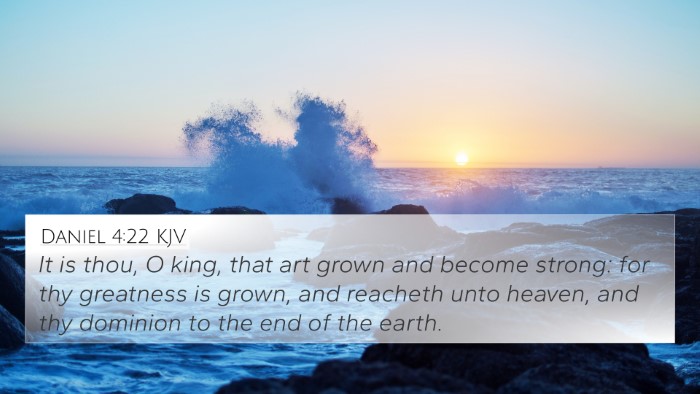Meaning and Interpretation of Genesis 11:4
Genesis 11:4 reads: “And they said, Go to, let us build us a city and a tower, whose top may reach unto heaven; and let us make us a name, lest we be scattered abroad upon the face of the whole earth.” This verse highlights humanity's ambition and desire for self-glory, reflecting a critical moment in biblical history.
Summary of Insights from Public Domain Commentaries
This interpretation combines insights from Matthew Henry, Albert Barnes, and Adam Clarke, focusing on the implications of the builders' intentions and the divine response to their actions.
The Ambition of Humanity
The collective effort of humanity to build a tower "whose top may reach unto heaven" indicates a desire to rival God's authority and position. Matthew Henry emphasizes that this quest for greatness stemmed from pride and an ambition to secure their legacy: “They intended to achieve a greatness that would make them famous forever.” This reflects a common biblical theme of pride preceding destruction.
Theological Implications
Albert Barnes interprets the intentions behind building a city with a tower as a manifestation of human arrogance and autonomy from God, indicating that the people wished to establish their own system of significance apart from divine authority. The desire to make a “name” for themselves contrasts starkly with God’s purpose for humanity to be fruitful and multiply, saturating the earth with His glory.
Divine Response and Judgment
The escalating ambitions of humanity did not go unnoticed. Adam Clarke comments on God’s response: “The Lord came down to see the city and the tower.” This phrase suggests that, while humanity builds upwards in pride, God must descend to oversee their works. This serves as a reminder of God’s omniscience and sovereignty over human endeavors.
Lessons on Unity and Division
The builders expressed a fear of being “scattered abroad,” revealing a profound misunderstanding of divine order. Matthew Henry notes that their unity was derived from a common purpose against God’s will, illustrating a theologically relevant dynamic: True unity is achieved not through rebellion but through obedience to God’s purposes, while disobedience leads to division and chaos.
Related Bible Verse Cross-References
- Genesis 1:28: God’s command to be fruitful and fill the earth.
- Genesis 9:1: God's instructions to Noah reaffirming population and dispersion.
- Isaiah 14:12-14: The pride of the fallen Babylon likened to the ambition displayed in Babel.
- Psalms 2:1-4: The nations conspiring against the Lord's anointed; a parallel of rebellion.
- Matthew 5:14-16: Being a light to the world contrasts with hiding one's purpose.
- Acts 2:1-12: The reversal of Babel’s confusion at Pentecost, symbolizing divine restoration of communication and purpose.
- Revelation 21:2: A new Jerusalem as a symbol of God’s ultimate plan for unity and community with humanity.
Exploring Themes and Connections
The narrative of Genesis 11:4 presents multiple avenues for thematic exploration and cross-referencing:
- Human ambition drives one to create systems that oppose divine structures.
- The struggle between human autonomy and divine authority reflects a recurring biblical theme.
- The importance of God's presence and guidance in fulfilling human purpose is pivotal.
- Rebellion against God often leads to confusion and division among people.
- The story of Babel serves as a warning against pride and the futility of opposing God's will.
Tools for Further Study
To delve deeper into the implications of Genesis 11:4 and its connections with other scriptures, it’s beneficial to utilize various tools for Bible cross-referencing, including:
- Bible concordance: A tool to locate specific words and their usage.
- Bible cross-reference guide: Helps to identify related verses based on themes.
- Cross-reference Bible study: Methodology for comparing verses across the entire text.
- Bible chain references: Following a theme or subject through connected verses.
- Cross-referencing Bible study methods: Different approaches to understanding scriptures in context.
Conclusion
Genesis 11:4 serves as a powerful reminder of the dangers of ambition uninformed by divine purpose. The insights from various commentaries reveal the depth of biblical narratives that challenge us to consider our motivations and align with God's intended order. By exploring the connections between Bible verses, we not only gain a clearer understanding of this specific verse but also unveil the intricate tapestry of scripture that speaks to God's sovereignty and the nature of humanity.
















